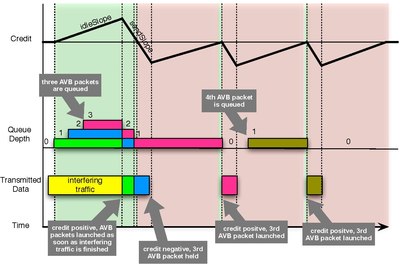Network congestion in data networking and queueing theory is the reduced quality of service that occurs when a network node or link is carrying more data than it can handle. Typical effects include queueing delay, packet loss or the blocking of new connections. A consequence of congestion is that an incremental increase in offered load leads either only to a small increase or even a decrease in network throughput.
Weighted round robin (WRR) is a network scheduler for data flows, but also used to schedule processes.
Deficit Round Robin (DRR), also Deficit Weighted Round Robin (DWRR), is a scheduling algorithm for the network scheduler. DRR is, like weighted fair queuing (WFQ), a packet-based implementation of the ideal Generalized Processor Sharing (GPS) policy. It was proposed by M. Shreedhar and G. Varghese in 1995 as an efficient and fair algorithm.

Random early detection (RED), also known as random early discard or random early drop is a queuing discipline for a network scheduler suited for congestion avoidance.
Generalized processor sharing (GPS) is an ideal scheduling algorithm for process schedulers and network schedulers. It is related to the fair-queuing principle which groups packets into classes and shares the service capacity between them. GPS shares this capacity according to some fixed weights.
In computer networking, a reliable protocol is a communication protocol that notifies the sender whether or not the delivery of data to intended recipients was successful. Reliability is a synonym for assurance, which is the term used by the ITU and ATM Forum.
Proportional-fair scheduling is a compromise-based scheduling algorithm. It is based upon maintaining a balance between two competing interests: Trying to maximize the total throughput of the network while at the same time allowing all users at least a minimal level of service. This is done by assigning each data flow a data rate or a scheduling priority that is inversely proportional to its anticipated resource consumption.
Fair queuing is a family of scheduling algorithms used in some process and network schedulers. The algorithm is designed to achieve fairness when a limited resource is shared, for example to prevent flows with large packets or processes that generate small jobs from consuming more throughput or CPU time than other flows or processes.
Bandwidth management is the process of measuring and controlling the communications on a network link, to avoid filling the link to capacity or overfilling the link, which would result in network congestion and poor performance of the network. Bandwidth is described by bit rate and measured in units of bits per second (bit/s) or bytes per second (B/s).
Head-of-line blocking in computer networking is a performance-limiting phenomenon that occurs when a line of packets is held up in a queue by a first packet. Examples include input buffered network switches, out-of-order delivery and multiple requests in HTTP pipelining.
In routers and switches, active queue management (AQM) is the policy of dropping packets inside a buffer associated with a network interface controller (NIC) before that buffer becomes full, often with the goal of reducing network congestion or improving end-to-end latency. This task is performed by the network scheduler, which for this purpose uses various algorithms such as random early detection (RED), Explicit Congestion Notification (ECN), or controlled delay (CoDel). RFC 7567 recommends active queue management as a best practice.
Weighted fair queueing (WFQ) is a network scheduling algorithm. WFQ is both a packet-based implementation of the generalized processor sharing (GPS) policy, and a natural extension of fair queuing (FQ). Whereas FQ shares the link's capacity in equal subparts, WFQ allows schedulers to specify, for each flow, which fraction of the capacity will be given.
Radio resource management (RRM) is the system level management of co-channel interference, radio resources, and other radio transmission characteristics in wireless communication systems, for example cellular networks, wireless local area networks, wireless sensor systems, and radio broadcasting networks. RRM involves strategies and algorithms for controlling parameters such as transmit power, user allocation, beamforming, data rates, handover criteria, modulation scheme, error coding scheme, etc. The objective is to utilize the limited radio-frequency spectrum resources and radio network infrastructure as efficiently as possible.
Virtual output queueing (VOQ) is a technique used in certain network switch architectures where, rather than keeping all traffic in a single queue, separate queues are maintained for each possible output location. It addresses a common problem known as head-of-line blocking.
Blue is a scheduling discipline for the network scheduler developed by graduate student Wu-chang Feng for Professor Kang G. Shin at the University of Michigan and others at the Thomas J. Watson Research Center of IBM in 1999.

A network scheduler, also called packet scheduler, queueing discipline (qdisc) or queueing algorithm, is an arbiter on a node in a packet switching communication network. It manages the sequence of network packets in the transmit and receive queues of the protocol stack and network interface controller. There are several network schedulers available for the different operating systems, that implement many of the existing network scheduling algorithms.
Time-Sensitive Networking (TSN) is a set of standards under development by the Time-Sensitive Networking task group of the IEEE 802.1 working group. The TSN task group was formed in November 2012 by renaming the existing Audio Video Bridging Task Group and continuing its work. The name changed as a result of the extension of the working area of the standardization group. The standards define mechanisms for the time-sensitive transmission of data over deterministic Ethernet networks.
Deterministic Networking (DetNet) is an effort by the IETF DetNet Working Group to study implementation of deterministic data paths for real-time applications with extremely low data loss rates, packet delay variation (jitter), and bounded latency, such as audio and video streaming, industrial automation, and vehicle control.
Enhanced Transmission Selection (ETS) is a network scheduler scheduling algorithm that has been defined by the Data Center Bridging Task Group of the IEEE 802.1 Working Group. It is a hierarchical scheduler that combines static priority scheduling and a bandwidth sharing algorithms.

Saverio Mascolo is an Italian information engineer, academic and researcher. He is the former Head of the Department of Electrical Engineering and Information Science and the professor of Automatic Control at Department of Ingegneria Elettrica e dell'Informazione (DEI) at Politecnico di Bari, Italy.



